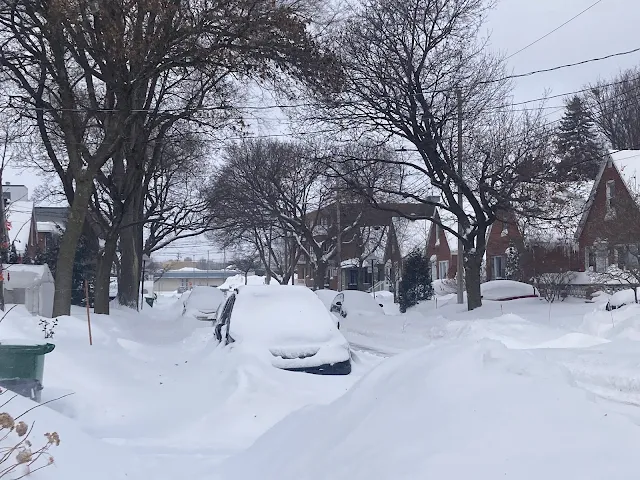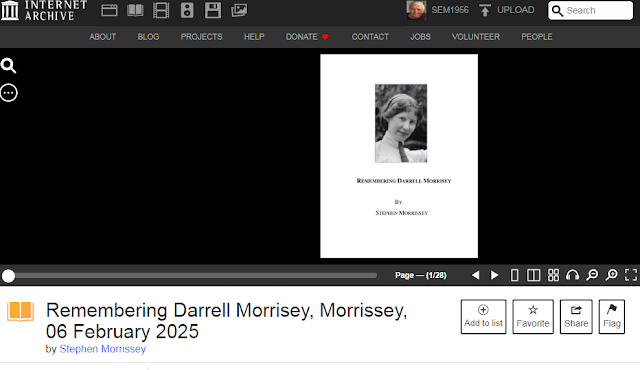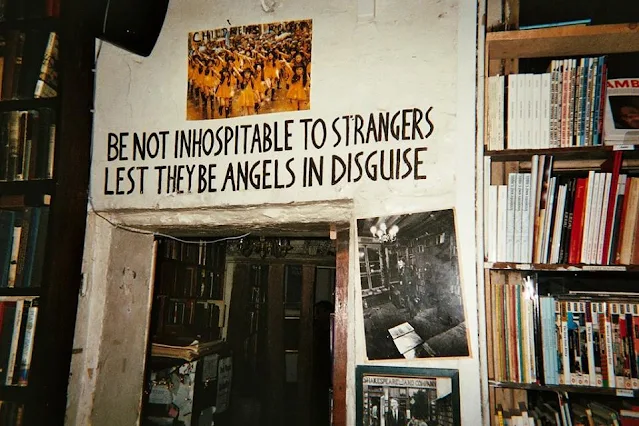 |
| My grandfather, John R. Parker, with his dog Dean in his backyard on Hampton Avenue |
Considering how seldom I saw my grandfather I seem to have more memories of him than of other family members. One day he told me that when he was growing up in Blackburn, Lancashire, England, he had killed a chicken and roasted it on a fire in a lane; I took this to refer to his growing up in poverty. One day he told me that if you wrap a box and use string, tie it on one of the edges of the box and it will hold better. He was trying to teach me something and now, so many years later, I appreciate his effort. Who tries to teach anyone anything anymore? My mother had many memories of her father, one recurring theme was him fighting, who does this anymore? There were only two incidents of this fighting that I know of; for instance, when he arrived in New York City around 1912 and lived with his Uncle William Parker, he drove a streetcar and one day someone tried to rob his streetcar, he chased the man down the street and beat him up; my grandfather was also a boxer in New York City but I know nothing about this. One day I was driving my mother to Central Train Station in Montreal, I remember exactly where this happened, she said "that corner is where a man was harassing a woman" and my grandfather had seen this and chased after the man, again fighting with him. In the 1920s my grandfather worked at the Central Fire Station in Old Montreal, that was after being fired from another job on the railway, something about having a gun. As a child or young person my mother would walk down the street to the fire station, from Mountain Street where they lived in an apartment and where my grandfather was also the janitor, and she would bring him his lunch or supper. One of the few stories I remember my grandfather telling me is that when he began working at the Central Fire Station they still had horses and the captain told him to polish the metal buttons on the harness; later he was told that he hadn't done a good job, there were buttons to polish even though they couldn't be seen on the underbelly of the horse. He remembered this and told me this story; was there a moral to the story or was it just a story from when he came to Canada.
In 1913 my grandparents' first born child, Willie, died of some illness; it was always said that the doctor never showed up, that the doctor had been drunk. We still have photographs of Willie, he was a beautiful child with longish blonde hair and he was much loved. Was this when my grandmother's depression became more evident? There are very few photographs of her and, at some point, she cut herself out of most of the photographs. Then, in 1916, my mother was born and her parents were very protective of her. When still a child a man followed my mother home, she had gone on an errand to the local dairy, and he followed her to where she lived on Richmond Street, hearing of this my grandmother ran out into the street with a milk bottom and chased the man ready to hit him with the bottle.
It is only now that I am old that I truly appreciate my grandfather. He had married my grandmother in Blackburn, Lancashire, England. She was two years his senior, she was a Chew and there was a whole family of people behind her, none of them wealthy, but they were people who had accomplished something in life. They were builders, landlords, plasterers, plumbers, or they worked in the mills, that's how they made their living. My grandfather was a Parker, he had three brothers and the brothers, and their mother, moved to Montreal to join my grandfather and grandmother; one brother was also a fireman in Montreal. There was another brother about whom I know very little; he had a girlfriend but his mother broke up their relationship, and the woman he married was worse in some way than the original girlfriend. My grandfather was the only son who had children. My grandfather also had a younger brother, Victor, who had some kind of mental illness and was not able to hold a job. One day in 1969 my mother said to me that her Uncle Victor had died, this was the first I had heard of Victor; he had been living at the Douglas Mental Hospital in Verdun, adjacent to Montreal, and he'd been there since his mother died in 1949. Victor's mother wanted her other three sons to look after Victor after she died but that didn't happen and he ended up in an institution. My mother and I went to William Wray, undertakers, on University Street and spoke to someone there; the casket was kept closed, they said he was in no shape to be seen. My Uncle John, my mother's younger brother, had avoided the whole situation of Victor's death because he was afraid someone would try to make him pay Victor's expenses. That's how things worked.
After my grandparents married my grandfather moved, by himself, to New York City, my grandmother would follow. In New York City my grandfather lived with his paternal uncle, William Parker, who worked a few blocks from where he lived, at the Bronx Zoo. When I was a child I would drive somewhere with my mother and if someone tried to cut her off she would say "I'd like to punch him in the nose", and then recount that this is what her father would say. I guess road rage has existed since people first started to drive. My mother would always recount how her father jacked up and levelled the floors in their flat, or how he built the front porch on their property; she, too, was handy, she could reupholster furniture, paint walls, pay bills, do her own banking and invest in the stock market; she had only contempt for women who were helpless and had always let their husbands do everything, women who can't even look after money so they were helpless when they were widowed. I am not sure my mother even liked other women. She rarely spoke of her mother but she had many memories of her father. One day she said to me, "Did you ever get the better of someone, get a good deal, break them down?" She was gleeful when she said this and it was the only time I heard her say something like this. She was excited and happy at getting a good deal. It was rough being a woman in the old days, a woman couldn't even have a bank account without her husband's approval and my mother was contemptuous of any rules or laws that held women back.
And now, these many years after my grandfather died, I, who never liked my grandfather, have come to appreciate him and what he did in life. He was not weak, he was strong, he looked after his family, they came first; his first child died and his wife was a depressive, but he got on with life. One day I was meeting my mother, maybe it was in the early 2000s just before she moved to Toronto. Seeing me standing on the street she called me, only this one time, "Dad", maybe I was beginning to look like her father or maybe her mind slipped for a second, slipped into the past.
These are some of the memories that I wanted to remember and have remembered about my grandfather, otherwise they will disappear into the ether of nothingness.
Note: maybe one day I'll edit this, rewrite parts of it, or delete it.
 |
| Rear view of 2217 Hampton Avenue |
.jpg) |
| His upstairs tenant, Mrs. Erskine |
 |
| After my grandmother died in 1957, my grandfather visited one of his wife's sisters (pictured) in Bercy, Saskatchewan |
 |
| I believe this was also taken in Bercy, Sask., and my grandfather is with his niece |


.jpg)
.jpg)
















.JPG)
.JPG)
.JPG)
.JPG)
.JPG)
.JPG)
.JPG)
.JPG)






,%20by%20sophie%20bassouls.jpg)



.JPG)
.JPG)
.JPG)
.JPG)
.JPG)
.JPG)
